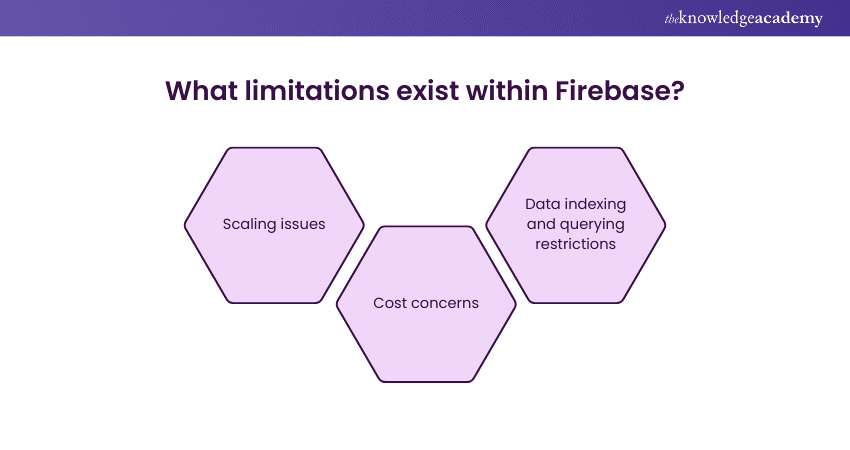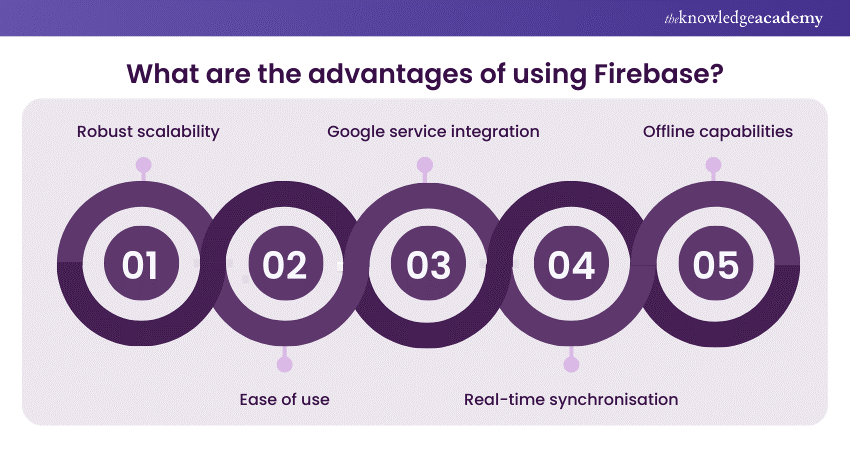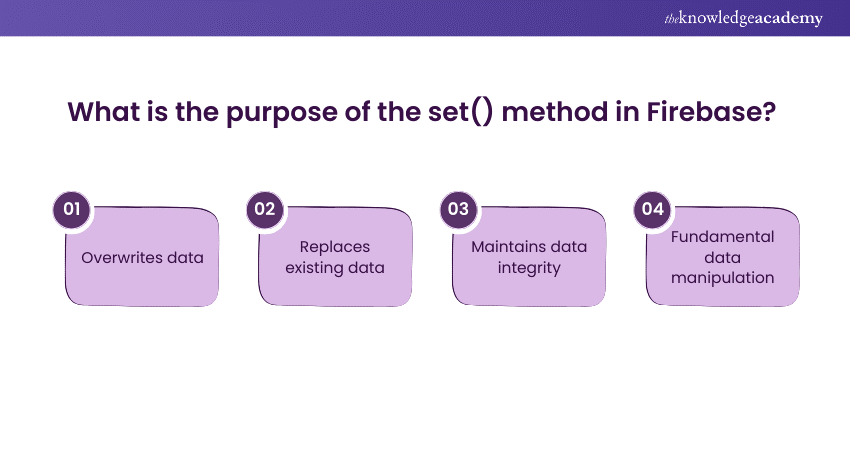We may not have the course you’re looking for. If you enquire or give us a call on +44 1344 203999 and speak to our training experts, we may still be able to help with your training requirements.
Training Outcomes Within Your Budget!
We ensure quality, budget-alignment, and timely delivery by our expert instructors.

Are you preparing for a technical interview that involves Firebase? Whether you are a new developer or a seasoned professional, understanding Firebase is crucial in today's tech-driven market. This blog post compiles a comprehensive list of Firebase Interview Questions that cover everything from the basic setup and features to more complex functionalities and security measures.
By exploring these questions, you will gain insights into what potential employers might ask during an interview and how best to articulate your knowledge and skills in Firebase. So, get ready to deepen your understanding and enhance your ability to confidently tackle Firebase Interview Questions.
Table of Contents
1) Firebase Interview Questions and Answers
a) What is Firebase?
b) What limitations exist within Firebase?
c) What features does Firebase offer?
d) How is the language determined in the Firebase Console?
e) Which browsers are compatible with the Firebase Console?
f) What are the advantages of using Firebase?
g) What are the limitations of the real-time database in Firebase?
h) What could prevent the use of Cloud Storage in Firebase?
i) Why is SHA-1 required in Firebase?
j) What types of events can be tracked in Firebase?
2) Conclusion
Firebase Interview Questions and Answers
We have prepared a thoroughly detailed list of the top 20 Firebase Manager Interview Questions along with their detailed response. Let’s look at them.
1) What is Firebase?
The interviewer wants to confirm your understanding of Firebase as a platform and its primary functions.
Sample Answer: Firebase is a comprehensive app development platform that Google supports, designed to help developers build mobile and web applications more efficiently. It offers a suite of tools including analytics, databases, messaging, and crash reporting to streamline the development process.
2) Who founded Firebase?
The interviewer wants to test your knowledge of Firebase's history and its founders.
Sample Answer: Firebase was founded by James Tamplin and Andrew Lee in 2011. Initially, it started as a real-time database providing backend services, before evolving into the more comprehensive development platform it is today after being acquired by Google in 2014.
3) What limitations exist within Firebase?
This question assesses your practical experience with Firebase and your ability to navigate its limitations.

Sample Answer: One of the main limitations of Firebase is its scaling, especially for complex queries and large data sets, which can become less efficient. Additionally, Firebase's real-time database can be costly for high-usage applications, and there are restrictions on indexing and querying data.
4) What features does Firebase offer?
Here, the interviewer is looking for a broad understanding of the services and features provided by Firebase.
Sample Answer: Firebase offers a wide range of features that cater to the needs of app developers, including real-time databases, user authentication, hosting, Cloud Storage, remote configuration, Machine Learning, and cloud functions, among others. These services are integrated and managed via a single, easy-to-use Console.
5) How does Firebase Authentication benefit app security?
The interviewer is interested in understanding your knowledge of Firebase's security features, specifically in the context of user authentication.
Sample Answer: Firebase Authentication provides a simple, secure way to authenticate users in your app. It supports various sign-in methods, including passwords, phone numbers, and popular third-party providers like Google, Facebook, and Twitter. This service helps secure user data by ensuring that only authenticated users can access their accounts and data. It also simplifies the development process by handling common tasks such as user management, password resets, and security tokens.
Learn how to make a full-stack application with our MEAN Stack Web Development Training – join today!
6) How is the language determined in the Firebase Console?
The interviewer aims to assess your familiarity with the configuration options of the Firebase user interface, specifically regarding language settings.
Sample Answer: The Firebase Console typically determines its display language based on the language settings of the user's web browser. However, if users wish to use a different language, they can manually adjust their language preference in the Console's settings. This flexibility allows users to work in their preferred language, enhancing usability and accessibility across diverse geographic and linguistic user bases.
7) Which browsers are compatible with the Firebase Console?
The interview tests your understanding of compatibility to indicate your readiness to use the platform across different environments.
Sample Answer: The Firebase Console is compatible with most modern web browsers, including Google Chrome, Mozilla Firefox, Safari, and Microsoft Edge. It is recommended to use the latest version of these browsers for optimal performance and security.
8) What are the advantages of using Firebase?
This question explores the benefits of Firebase from a practical standpoint.

Sample Answer: Firebase offers robust scalability, ease of use, and integration with other Google services, making it exceptionally beneficial for developers looking to streamline their app development process. It also provides real-time data synchronisation and offline capabilities, enhancing app responsiveness and reliability.
9) What are the limitations of the real-time database in Firebase?
Your answer should demonstrate awareness of potential challenges when using Firebase's real-time database.
Sample Answer: The real-time database in Firebase does not support complex querying and indexing, which can be a significant limitation for applications requiring advanced query capabilities. Additionally, it has limitations on data structuring and can become expensive for applications with large data throughput.
10) What could prevent the use of Cloud Storage in Firebase?
The interviewer wants to evaluate your troubleshooting capabilities and knowledge regarding the operational requirements of Firebase's Cloud Storage service.
Sample Answer: Several issues can hinder the effective use of Cloud Storage, such as incorrectly configured security rules, the absence of internet connectivity, or the use of SDK versions that are not compatible with the service. It is essential to verify that all configurations, including security settings and permissions, are properly set up to ensure that Cloud Storage functions effectively. This thorough checking can prevent disruptions and ensure that the service is reliable and secure for storing and managing app data.
11) What benefits will developers transitioning from Google Cloud Messaging (GCM) to Firebase Cloud Messaging (FCM) experience?
This question assesses your understanding of the enhancements made from GCM to FCM.
Sample Answer: Developers moving from GCM to FCM will benefit from a more robust and versatile messaging solution. FCM provides improved message targeting, simplified client development, and better message reliability and delivery. Additionally, FCM integrates seamlessly with other Firebase services, enhancing overall app functionality and user engagement.
12) Why is SHA-1 required in Firebase?
The interviewer aims to assess your understanding of the security configurations in Firebase, particularly regarding the use of SHA-1.
Sample Answer: SHA-1 is essential in Firebase for setting up and utilising Google services such as Google Sign-In and Firebase Dynamic Links. It serves to verify the authenticity of an application that is communicating with Google services. This verification is crucial for preventing security risks like man-in-the-middle attacks and other potential threats, thereby ensuring secure and trusted interactions within the application.
13) What types of events can be tracked in Firebase?
This question assesses your understanding of Firebase's analytical capabilities and how they can be leveraged to gather app usage data.
Sample Answer: Firebase allows tracking of various types of events, which include user interactions such as app launches, updates, and in-app transactions. Moreover, developers have the flexibility to define and track custom events, which facilitates the collection of analytics that are specifically tailored to the app’s unique requirements. This capability enables a deep dive into user behaviour, enhancing the potential for targeted improvements and strategic decision-making.
14) What are Firebase Cloud Functions?
The interviewer is looking to know understanding of one of Firebase's scalable solutions for running backend code.
Sample Answer: Firebase Cloud Functions is a serverless framework that allows developers to run backend code in response to events triggered by Firebase features and HTTPS requests. This code runs in a managed environment on Google Cloud, thus eliminating the need for server management.
15) How can you merge an existing Firebase.com app with an existing Google project into a single Firebase project?
The interviewer wants to test your practical skills in managing and configuring Firebase projects.
Sample Answer: To merge an existing Firebase.com app and a Google project into a single Firebase project, I first need to add the Firebase.com app to the Google Cloud project via the Firebase Console. This involves using the 'Add project' option and selecting the existing Google Cloud project to ensure that all configurations and services are unified under one project.
Learn the latest version of the PHP framework Laravel with our Laravel Web Development Training – register today!
16) What permissions does the Firebase Console support?
The interviewer is exploring your knowledge of access control mechanisms within Firebase.
Sample Answer: The Firebase Console supports various permissions that can be configured based on user roles, including owner, editor, and viewer. These roles determine the level of access a user has, from viewing data and analytics to full administrative rights over the Firebase project.
17) What is the purpose of the set() method in Firebase?
Understanding specific Firebase functions indicates your technical proficiency with the platform.

Sample Answer: The set() method in Firebase is primarily used to write or overwrite data at a specified path in the database. When this method is invoked, it replaces the existing data at that path, including any data in its child paths. This functionality is crucial for maintaining data integrity and consistency, especially when updates are necessary. It is a fundamental method for data manipulation within Firebase, enabling developers to effectively manage and update their database content.
18) Is it necessary to use other Firebase services when using Firebase Cloud Messaging (FCM)?
The interviewer wants to check your ability to integrate multiple Firebase services.
Sample Answer: While it is not necessary to use other Firebase services with FCM, integrating them can enhance app functionality and streamline operations. For example, using Firebase Analytics alongside FCM can help in analyzing the effectiveness of your messaging campaigns to improve user engagement.
19) How do you create Closed Funnels?
The interviewer wants to assess your skills in advanced analytics within Firebase.
Sample Answer: Creating Closed Funnels in Firebase involves defining a series of sequential events that you expect users to complete in a session. This can be configured in Firebase Analytics by setting up custom events that track user progress through these pre-defined steps, allowing you to measure conversion rates and identify drop-off points.
20) How does Firebase differ from MongoDB?
This question explores your understanding of different backend solutions.
Sample Answer: Firebase and MongoDB offer different approaches to data management. Firebase provides a real-time database and a cloud firestorm that offers seamless integration with other Google services, real-time capabilities, and automatic scaling. MongoDB, on the other hand, is a NoSQL document database known for its high performance, flexibility, and rich querying capabilities. While Firebase excels in real-time data synchronisation and ease of use, MongoDB offers more robust data processing capabilities and is better suited for complex, large-scale applications.
Conclusion
Mastering these Firebase Interview Questions can significantly boost your confidence and readiness for any job interview focused on this versatile platform. Prepare thoroughly and understand the nuances of each question, and you will be well-equipped to showcase your skills and knowledge. This potentially leads to successful outcomes in your career pursuits involving Firebase.
Gain in-depth knowledge of setting up and managing projects programmatically with our Firebase Training – join today!
Frequently Asked Questions
Upcoming Programming & DevOps Resources Batches & Dates
Date
 Firebase Training
Firebase Training
Fri 14th Jun 2024
Fri 30th Aug 2024
Fri 22nd Nov 2024









 Top Rated Course
Top Rated Course



 If you wish to make any changes to your course, please
If you wish to make any changes to your course, please


